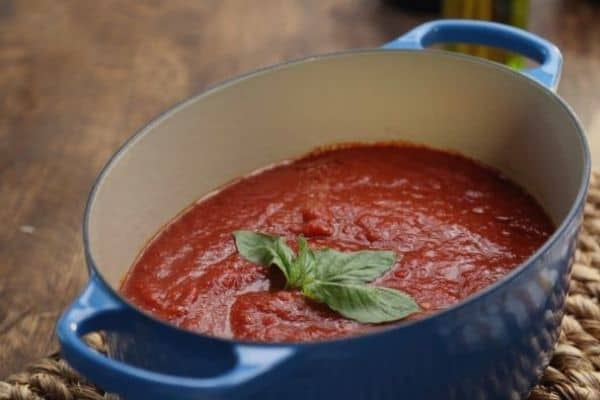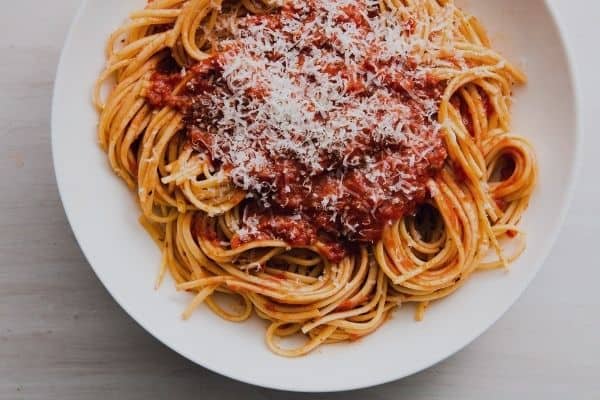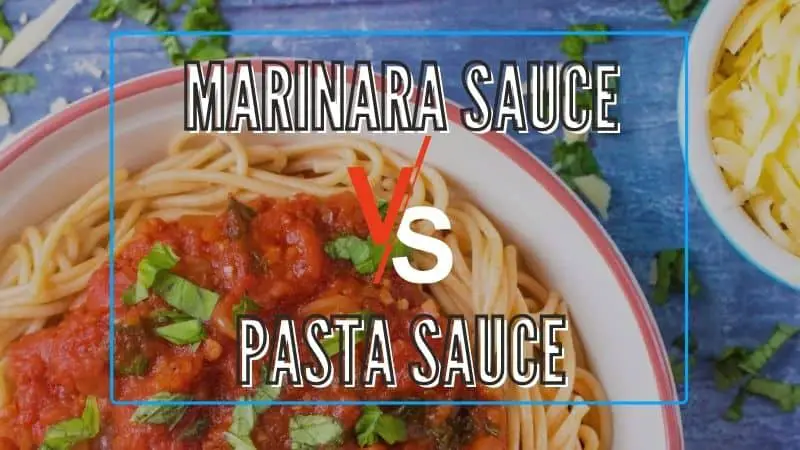There are many different types of tomato sauces. Marinara sauce is a type of pasta sauce that originates from Italy and contains tomatoes, garlic, olive oil, salt, and basil. It is sometimes spiced with red pepper flakes or black peppercorns. In this post we will explore the differences between marinara vs pasta sauce as well as their ingredients to help you decide which one is right for your dish!
What is Marinara Sauce?
Marinara sauce can be described as a tomato-based sauce that is comprised of onions, tomatoes, garlic, and fresh herbs. The primary difference between spaghetti sauce and marinara sauce is that marinara sauce has fewer components, while spaghetti sauce may include extra ingredients such as meats, vegetables, and/or vegetables.

What is marinara sauce used for
- Pasta sauce: Most of marinara sauce that is served with pasta. It pairs well with any kind of pasta.
- Sauce for pizza
- Sauce for dipping nuggets, potato cheese sticks, etc.
- Dishes – Marinara sauced meatballs, marinara sauced chicken, shakshuka, etc.
What is Spaghetti Sauce?

- Spaghetti sauce is a catch-all phrase for sauces used with spaghetti or similar noodle meals. Marinara sauce is the sauce for pasta. However, spaghetti may be eaten with a variety of sauces, some of which include tomatoes and others do not.
- Consider spaghetti noodles with sauces such as alfredo, bolognese, or alfredo, all of which may be called spaghetti sauces. A sprinkle of olive oil, or even butter and sage, may be called spaghetti sauces as well.
- Typically, spaghetti sauces are accompanied with a tomato or marinara sauce. The misunderstanding between marinara and spaghetti sauce is reasonable, since many people believe spaghetti sauce to be marinara or red. However, they are distinct.
- That instance, when we think of spaghetti sauce, we envision a hearty and delicious red tomato sauce that is usually accompanied by cheese and meat. This is because “spaghetti sauce” is a colloquial word for any tomato-based sauce served with spaghetti in both the United States and other areas of the globe that are not Italy.
- There are additional recipes that incorporate spaghetti noodles and sauce, such as Spaghetti Aglio e Olio, which is spaghetti flavored with oil and garlic, Spaghetti alla Carbonara, which is a reference to “spaghetti coal worker’s style” and is made with eggs, bacon, and a cheese-based sauce, and Spaghetti with meatballs, which is an Italian-American cuisine that incorporates a tomato-based sauce.
The Difference Between Marinara Sauce and Spaghetti Sauce
Due to their striking resemblance, you may include both into a variety of dishes. However, if you want to get a deeper understanding of the technique, as well as the taste profiles and textures, in order to decide which one to use for a particular meal, consider the following critical differences:
Flavor
Spaghetti sauce is more viscous and has a distinct meaty flavor. The sauce’s tastes are usually well-balanced. Marinara sauce acts as a medium for each ingredient’s taste to shine through. It’s less sour, and you’ll have more freedom to create your own tastes.
This is why spaghetti sauce is excellent for infusing your meal with flavor. Marinara sauce is an excellent option for meals that need more flavor. Plain pasta works very well with spaghetti sauce. If you’re adding seafood to your pasta, you may want to use marinara sauce to bring out the taste of the fish.
Texture
There is a significant difference in texture between marinara and pasta sauce. Marinara sauce is liquid and thin, while spaghetti sauce is thicker due to the addition of cream, cheese, meat, and vegetables.
You add extra ingredients or tomatoes to make spaghetti sauce from marinara. Alternatively, you may reduce the marinara sauce proportionately until you get the characteristic thick texture of spaghetti sauce.
A thicker, less marinara sauce, sometimes called spaghetti sauce, is ideal for making substantial, rich comfort meals. Choose a smooth, silky-smooth marinara sauce for delicate meals.
Preparation
Marinara Sauce preparation does not begin with sautéing onions, garlic, and beef. Marinara requires a more expedient preparation procedure. All you need to do is prepare the spaghetti sauce and then add your desired pasta. You are allowed to substitute different components.
On the other hand, Spaghetti Sauce must be prepared with onions and garlic. After that, combine the meat and other ingredients. Additionally, you add tomato paste to help thicken the sauce.
The sauce is then simmered for an extended period of time to combine all the flavors. The dish incorporates a variety of herbs and spices to enhance the taste.
Therefore, if you’re looking for a quick supper, pick marinara. It’s fast and easy to prepare in less than ten minutes. While spaghetti sauce takes longer to make and needs more ingredients.
Ingredients
Additionally, both sauces have the same components. The only difference is that spaghetti calls for meat. In contrast to marinara sauce, which is made entirely of tomatoes, basil, and garlic. However, you may include sausages, peppers, mushrooms, cheese, and olives into spaghetti sauce.
Numerous cooks suggest starting with a marinara foundation and then adding meat to enhance the delicious taste. Several spaghetti sauce recipes may be converted to marinara sauces by omitting the meat.
Can You Substitute Marinara Sauce for Spaghetti Sauce?
Without a doubt. Because marinara is also a tomato-based sauce, it may be a suitable substitute for spaghetti sauce. However, because this is a vegetarian dish, you may want to add cheese, meat, or even seafood.
However, substituting spaghetti sauce with marinara sauce is not as simple. Certain variations are made with white wine or pesto. As a result, they are ineligible for replacement.
However, since the majority of spaghetti sauces include pig, beef, or another kind of meat, these substitutes may lack the genuine flavor of marinara.
Conclusion
We hope that you now have a better understanding of what pasta sauces are and how each one can be used in your cooking. Marinara sauce is always going to be marinara sauce, but spaghetti sauce could mean anything from tomato-based or not. So when you go into the grocery store next time, make sure you know which type of pasta sauce you need for your dish!
